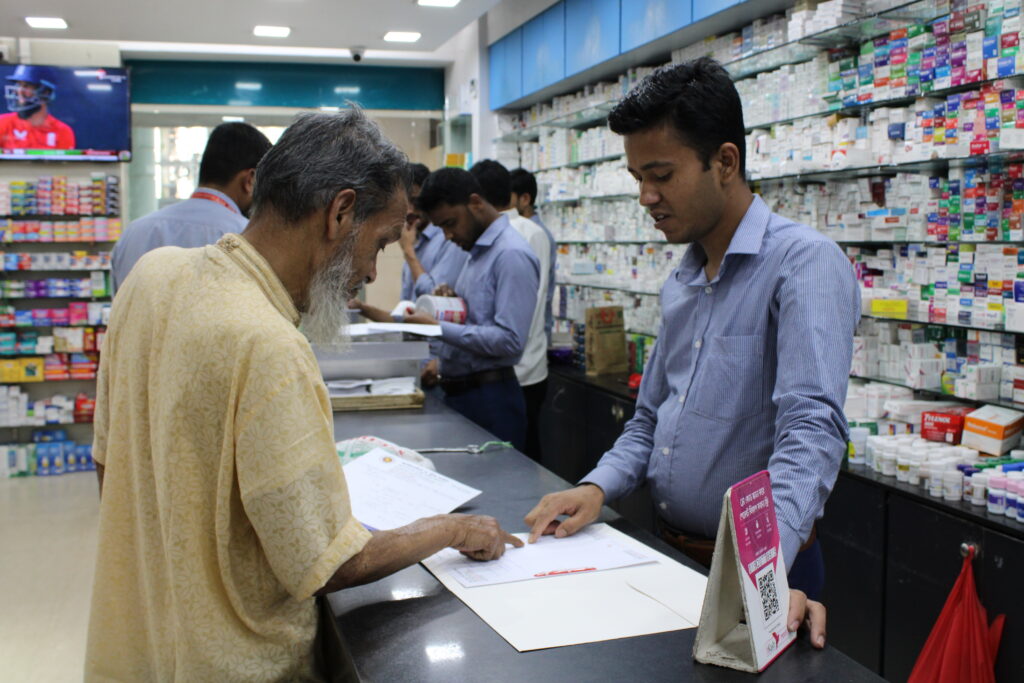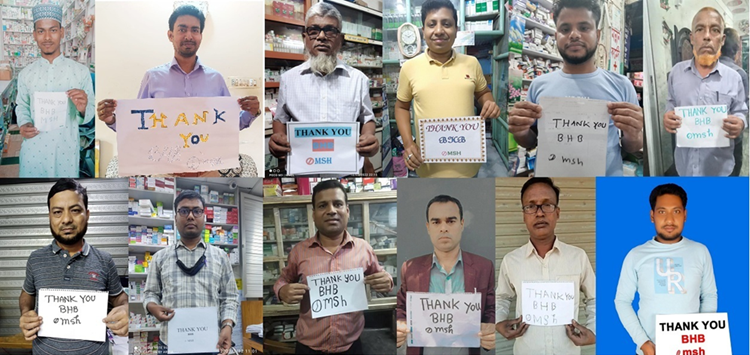Specialized Approach to Training Medicine Dispensers Shows Positive Results in Bangladesh
Specialized Approach to Training Medicine Dispensers Shows Positive Results in Bangladesh
By Raian Amzad, Senior Technical Advisor, Better Health in Bangladesh

A new study has shown positive outcomes from a pharmaceutical systems strengthening approach originally piloted in Africa but adapted for use in Bangladesh. The study offers potential for others looking to empower medicine dispensers in low- and middle-income countries (LMICs) to optimize patient care.
The Better Health in Bangladesh (BHB) project, led by Management Sciences for Health (MSH), has been supporting the Ministry of Health and Family Welfare to develop and implement an accreditation model for pharmacies and medicine shops. The project builds on work MSH pioneered in Tanzania in 2003 to help regulate informal drug shops—a model that has since been adapted to and adopted in several countries across Africa and Asia. BHB adjusted the Tanzania model to fit the country context and the local needs expressed by partners, stakeholders, and policy makers in Bangladesh. The approach includes accrediting medicine shops and training the people who dispense the medicines.
Accrediting medicine shops
Retail medicine shops play a pivotal role in health care. In Bangladesh, as in many LMICs, dispensers at medicine shops are often the first point of contact for patients, and many types of drugs can be purchased over the counter without a prescription. With more than 150,000 licensed and an equal number of unlicensed medicine shops operating in Bangladesh, regulating antibiotic use, disposing of expired medicines, and ensuring access to quality and safe products proves challenging. The quality of the existing basic certificate course for pharmacy dispensers needed to be augmented to help prevent things like dispensing errors and expired medications and to close knowledge gaps.
The implementation of an accreditation model for retail medicine shops and subsequent development of Bangladesh’s first national standards for retail medicine shops has resulted in improved access to affordable, quality pharmaceutical products and services in the country.
In Bangladesh, medicine shops can now be accredited as either Model Pharmacies or Model Medicine Shops depending on the location, level of education of the employees, physical specifications of the building, and services offered.
Educating providers
In September 2018, Bangladesh introduced an 80-hour Good Pharmacy Practice (GPP) training, with funding from the UK’s Foreign, Commonwealth and Development Office and technical support from BHB, to mitigate the many challenges and provide safe and quality pharmacy services. Despite having to pivot to online training during the COVID-19 pandemic, the project has trained 11,577 medicine dispensers to date and aims to train an additional 2,500 by the end of 2023.

The training covers topics such as establishing and operating a Model Pharmacy or Model Medicine Shop, the health system of Bangladesh, the code of ethics for pharmacists, rules and regulations, the human body, microbiology, and medicine management. It also trains medicine dispensers on pharmacovigilance and potential side effects of medicines, rational use of medicines, how to effectively communicate with and counsel patients on things like over-the-counter and prescription-only medicines, family planning, nutrition, environment, antimicrobial resistance, TB, and more.
A recent study assessed GPP knowledge, attitudes, and practices among dispensers who participated in the training program. The findings were published in Frontiers in Pharmacology on July 12, 2023. BHB project staff were gratified to see the published results of the study because it validates what we already know: that adapting an intervention to the context of the country is the most effective way to allocate resources and achieve desired outcomes.
Researchers compared 220 GPP-trained dispensers with 220 non-GPP trained dispensers using a semi-structured questionnaire and observation checklist. The results indicate that GPP-trained participants possessed better knowledge of dispensing guidelines, temperature maintenance, medicine storage conditions, and medicine labeling. Their dispensing practices were also superior, particularly in areas like customer counseling and maintaining proper storage temperature. The study suggests that while GPP training is beneficial, periodic retraining is essential for a sustained positive impact on overall pharmacy practices in the country.
To facilitate this type of continuous education, BHB introduced an e-Learning platform tailored to pharmacy dispensers’ needs. This free platform offers dispensers the opportunity to continue their study of GPP and expand their knowledge of the topics covered in the training. Thousands of students have enrolled and received e-Certificates upon course completion. The project maintains a connection with dispensers through its Facebook page, sharing GPP-focused content to instill good practices in their daily routines and encouraging broader engagement through information sharing.
Training participants say the knowledge they acquired during the training is already changing the way they approach patient care. Mohammed Osman Gani, a medicine dispenser from Cox’s Bazaar district who completed the online GPP training, says, “In addition to topics like over the counter and prescription only medicines, dosage forms, and side effects of medicines, I also learned to establish a cordial relationship with my clients to communicate medicine-related information. I think the most important thing I learned is about antibiotic resistance and our role as dispensers in reducing it.”
After GPP training, dispensers apply their newfound knowledge in their medicine shops with ongoing support from the BHB project team. Subsequently, local drug authorities conduct inspections, and successful inspections lead to the designation of these shops as Model Medicine Shops. BHB has undertaken a new study to assess the knowledge, attitudes, and practices of dispensers from Model Medicine Shops and will share insights from this research upon its publication.